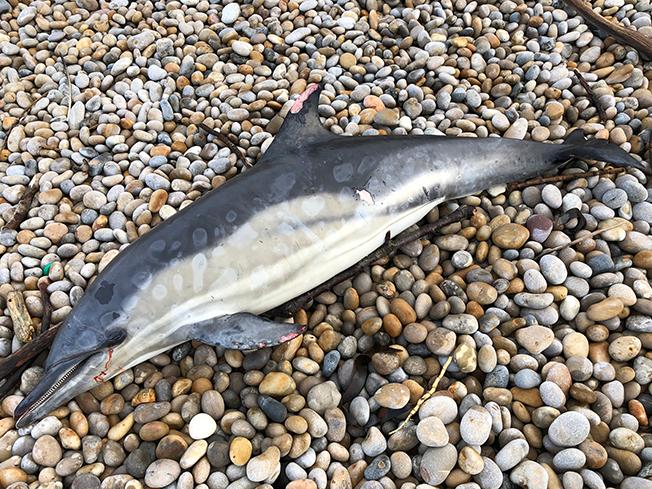Dorset Wildlife Trust (DWT) has been made aware of reports that a number of dead dolphins and porpoises have been washed up on Dorset’s beaches this winter. We have been receiving information about sightings since 7th November.
The cause of death is unknown although higher numbers are often recorded at this time of year with stronger winds, bigger swells and larger waves more likely to wash carcasses ashore.
It is important that these are reported as soon as possible to enable organisations to assess and record the carcass before it decomposes. In some instances, experts from the Cetacean Strandings Investigation Programme (CSIP) may undertake a post-mortem examination to try to determine the cause of death.
DWT’s Chesil Centre Officer, Sarah Hodgson, said, “There are many reasons that could cause these animals to die, either simply due to natural causes or as a result of human activity such as by-catch from commercial fisheries, entanglement from ghost fishing-gear or pollution. However, without in-depth examinations we can only speculate.”
The strandings have been either Common Dolphins or Harbour Porpoises but a rare White-beaked Dolphin, measuring over 9 feet in length, was recently discovered at Hallelujah Bay on Portland.
Sarah said, “Whilst it is unusual to see a White-beaked Dolphin, we are aware that there is a small population of these dolphins which are resident in Lyme Bay. We have passed details and photos to MARINElife who have been researching this local population”.
Dorset Wildlife Trust encourages anyone who finds a marine mammal washed up to report it as soon as possible by calling 01305 264620 or emailing [email protected]. It is helpful if you can include a photograph of the animal but not to touch it as they can carry diseases. Once it has been reported a DWT representative will be able to complete a strandings report to send to CSIP for their national database and potentially further investigation.
The recent strong south westerly winds have also brought in a number of Portuguese man o’war which are normally found out in the open Atlantic Ocean. These creatures are not true jellyfish but floating colonies formed by coral-like hydroids which together create the bubble-like float and long, venom-filled stinging tentacles that can reach 10 – 30m long. The gas-filled iridescent float can angle itself to catch the wind on the sea’s surface and can measure up to 30cm long, although those found recently have been much smaller.
If you find one, we advise that you do not touch them, as they can sting even when dead.







